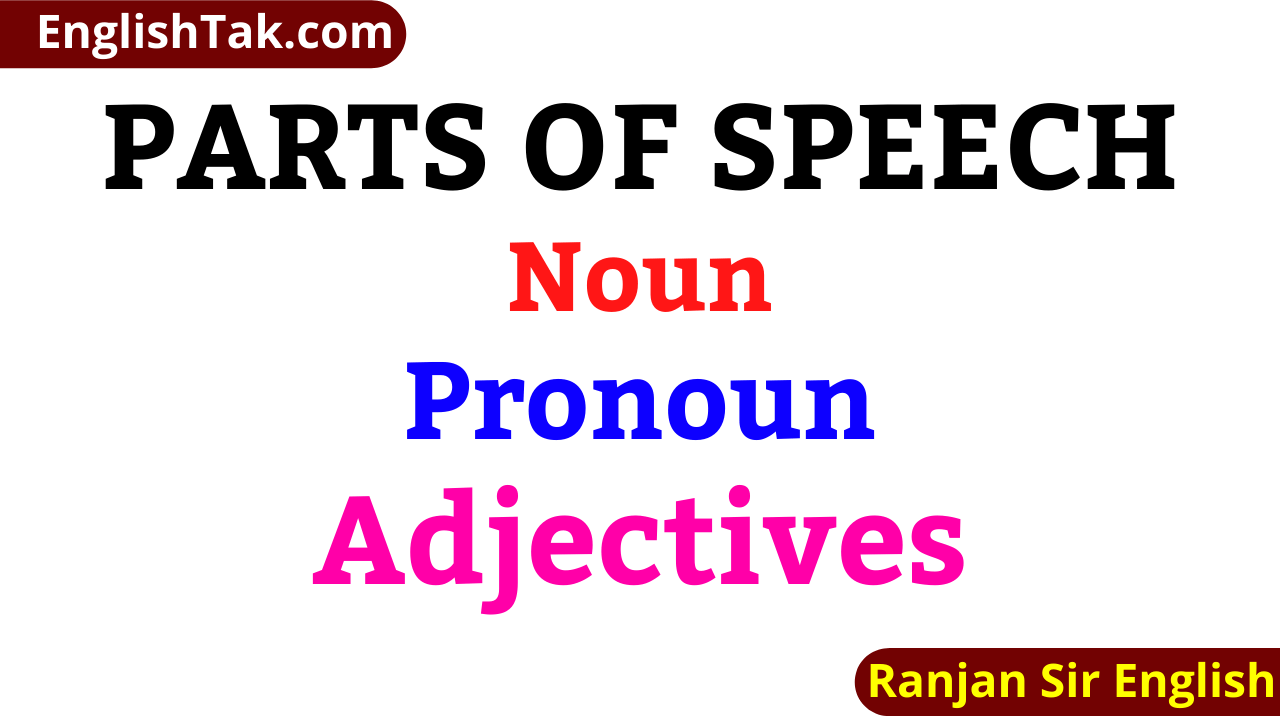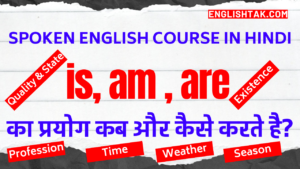![]()
PARTS OF SPEECH IN HINDI
Friends, today I am writing the basic rules of ‘Parts of Speech in Hindi’. As you know it is an integral part of the English language. For all those who belong to Hindi medium, I have also written the Hindi of every important sentence.
दोस्तों आज मैं ‘पार्ट्स ऑफ स्पीच इन हिंदी’ के मूल नियम लिख रहा हूं। जैसा कि आप जानते हैं कि यह अंग्रेजी भाषा का एक अभिन्न अंग है। उन सभी के लिए जो हिंदी माध्यम से ताल्लुक रखते हैं, मैंने हर महत्वपूर्ण वाक्य की हिंदी भी लिखी है।
In this post, you will get details of Noun, Pronoun and Adjective
Learning Objectives
After the completion of this chapter, the learner will be able to :
| Explain various parts of speech and use them. * Noun * Verb * Adverb * Pronoun * Preposition * Conjunction * Adjective * Interjection |
Parts of Speech in Hindi
Words perform different functions in a sentence. They convey different meanings as per their position in the sentence. Based on their use and functions, words are categorised into several types or parts of speech.
शब्द एक वाक्य में विभिन्न कार्य करते हैं। वे वाक्य में अपनी स्थिति के अनुसार अलग-अलग अर्थ व्यक्त करते हैं। उनके उपयोग और कार्यों के आधार पर, शब्दों को कई प्रकार या भाषण के कुछ हिस्सों में वर्गीकृत किया जाता है।
1. Noun
2. Pronoun
3. Adjective
4. Verb
5. Adverb
6. Preposition
7. Conjunction
8. Interjection
NOUN
Nouns are the simplest among the parts of speech. A Noun refers to words that are used to name persons, things, animals, places, ideas or events. In simple words, nouns are naming words.
पार्ट्स ऑफ़ स्पीच में संज्ञा सबसे सरल हैं। एक संज्ञा उन शब्दों को संदर्भित करती है जिनका उपयोग व्यक्तियों, चीजों, जानवरों, स्थानों, विचारों या घटनाओं के नाम के लिए किया जाता है। सरल शब्दों में संज्ञा वह शव्द है जिससे किसी नाम का बोध हो।
Such as
Manav, boys, class, Chandigarh, cattle, happiness, marriage are examples of nouns.
Let us look at some of these for clear understanding.
For Example :
1. Shakespeare was a great dramatist.
The underlined word is a noun that refers to a person.
2. This book is new.
The underlined word is a noun that refers to a thing.
3. Patna is my beloved city.
The underlined word is a noun that refers to a place.
4. Love is the best feeling.
The underlined word is a noun that refers to an idea.
5. Sympathy can be extremely helpful.
The underlined word is a noun that refers to an idea.
6. Lion is the king of the jungle.
The underlined word is a noun that refers to an animal.
7. I celebrated my anniversary.
The underlined word is a noun that refers to an event.
We can categories nouns as given below:
1. Proper Nouns : They always start with a capital letter and refer to specific names of persons, places, or things.
वे हमेशा एक बड़े अक्षर से शुरू होते हैं और व्यक्तियों, स्थानों या चीजों के विशिष्ट नामों का उल्लेख करते हैं।
For Example : Rohan, The Ramayana, The Vindhyas, Bharat
2. Common Nouns : The name which is given to different persons or things of a class or a type in the same way is called common noun.
जो नाम किसी वर्ग या प्रकार के भिन्न-भिन्न व्यक्तियों या वस्तुओं को एक ही प्रकार से दिया जाता है, Common Noun कहलाती है।
For Example : house, school.
3. Concrete Nouns : They refer to nouns which you can perceive through your five senses.
वे संज्ञाओं को संदर्भित करते हैं जिन्हें आप अपनी पांच इंद्रियों के माध्यम से देख सकते हैं।
For Example : mud, cement, wood.
4. Abstract Nouns : These are nouns which you can’t perceive through your five senses.
ये वे संज्ञाएं हैं जिन्हें आप अपनी पांच इंद्रियों के माध्यम से नहीं समझ सकते हैं।
For Example : sadness, happiness.
5. Countable Nouns : Anything that is countable, and has a singular and plural form is a countable noun.
कोई भी वस्तु जो गणनीय हो और जिसका एकवचन और बहुवचन रूप हो, वह गणनीय संज्ञा होती है।
For Example : dogs, bats.
6. Uncountable Nouns : Anything that cannot be counted and needs to have ‘counters’ to quantify it with terms like kilo, cup, meter, etc.
कुछ भी जिसे गिना नहीं जा सकता है और जिसे किलो, कप, मीटर आदि शब्दों के साथ मापने के लिए ‘काउंटर’ की आवश्यकता होती है।
For Example : dust, sand, water, a sack of sand, a pail of water.
7. Collective Nouns : Such nouns refer to a group of persons, animals, or things.
ऐसी संज्ञाएं व्यक्तियों, जानवरों या चीजों के समूह को संदर्भित करती हैं।
For Example : cluster, class, herd : a class of boys, a herd of cattle, a cluster of stars
Parts of Speech in Hindi
PRONOUN
1. Rohan is a good athlete. He practises for at least ten hours a day.
2. Meera is a good cook. She has also written a recipe book.
In the above sentences, the nouns, ‘Rohan’ and ‘Meera’ are replaced by ‘He’ and ‘She’ in the subsequent sentences. These are used in place of the nouns, ‘Rohan’ and ‘Meera’ to avoid repetition. Such words are called pronouns. They are ‘Friends of Nouns’. They belong to a sub class of nouns. They define new creations.
उपरोक्त वाक्यों में, संज्ञाएं, ‘रोहन’ और ‘मीरा’ को बाद के वाक्यों में ‘He’ और ‘She’ द्वारा प्रतिस्थापित किया जाता है। इनका प्रयोग संज्ञाओं, ‘रोहन’ और ‘मीरा’ के स्थान पर दोहराव से बचने के लिए किया जाता है। ऐसे शब्दों को सर्वनाम कहते हैं। वे ‘संज्ञाओं के मित्र’ हैं। वे संज्ञा के एक उप वर्ग से संबंधित हैं। वे नई रचनाओं को परिभाषित करते हैं।
Pronouns are of the following types:
1. Personal Pronouns:
I, we, you, he, she, it, etc.
2. Indefinite Pronouns:
one, someone, somebody, all, etc.
3. Relative Pronouns:
who, whom, what, as, that, etc.
4. Demonstrative Pronouns:
this, these, those, such, etc.
5. Distributive Pronouns:
each, either, neither, etc.
6. Interrogative Pronouns:
which, whose, who, etc.
Read More…
ADJECTIVE
An adjective is a word that is used to qualify or describe a noun or a pronoun. An adjective is descriptive by nature. Adjectives add something to the meaning of a noun or a pronoun.
विशेषण एक ऐसा शब्द है जिसका उपयोग संज्ञा या सर्वनाम को वर्णन या व्याख्या करने के लिए किया जाता है। एक विशेषण स्वभाव से वर्णनात्मक है। विशेषण संज्ञा या सर्वनाम के अर्थ में कुछ जोड़ते हैं।
Examples : a red pencil, a blue shirt, a smart boy.
1. It is a red pencil.
2. He is wearing a blue shirt.
3. Harry is a smart boy.
The underlined words are Adjectives. There are different kinds of adjectives. They express the quality or state of mind of the word they qualify.
| Suggested For You | |
|---|---|
| Grammar | Spoken English Tak YouTube Channel |
| Spoken English | Videos |
| Ranjan Sir Blog | Join Our WhatsApp Group |
1. Adjectives of Quality : They tell the quality or the state of something they qualify,
Ex. nice couple, happy life, fine cloth.
2. Adjectives of Quantity : They tell us how much of a thing is expressed.
Ex. some, much, little, less etc.
Much ado about nothing.
All the fruits were fresh.
3. Adjectives of Numbers : They tell us how many persons or things are expressed. e.g, many, all, two, three, a few, etc.
A student was writing on the blackboard.
Two monkeys were fighting with each other.
Many girls were playing in the ground.
They are sub divided into:
(i) Cardinal numbers : Exact numbers like one, two, three etc.
(ii) Ordinal numbers : They denote ranks or order like first, second, third, etc.
(iii) Indefinite adjectives : They do not express any exact number; some, any, all, enough, few, no, none etc.
For Example : Enough money was given to the beggar.
All the players applauded their team.
4. Distributive Adjectives : Express that persons or things denoted by the noun are taken singly or in separate lots, such as: each, every,
neither, either etc.
For Example : Each child was given an orange.
Every student had a book in hand.
5. Demonstrative Adjectives : They are used to point out the persons or things that they qualify, such as: this, that, those, such etc.
For Example : This chair is made of teak wood.
Such elements are harmful for our health.
6. Interrogative Adjectives : They are used to ask questions, e.g., which, what, whose etc.
For Example : Whose book is that?
Which house is theirs?
Which dress will you wear?
7. Possessive Adjectives : They indicate possession of a thing or person.
For Example : My story is interesting.
Your shirt is beautiful.
His picture was excellent.
8. Proper Adjectives : They are derived from proper nouns and always begin with a capital letter, e.g., The African Safari, The English Queen.
For Example : We enjoyed the African Safari in Kenyan jungles.
An Indian writer won the Nobel Prize.
Part-2 Coming Soon
Parts of Speech in Hindi

Written by Rohit
Read Ranjan Sir Blog
If you like this post (Parts of Speech in Hindi), then share this post among your friends as much as possible; And if you have any suggestion, then do not forget to write it in the comment, for your convenience, this post has been written in English as well as Hindi.
अगर आपको यह पोस्ट पसंद आए तो इस पोस्ट को ज्यादा से ज्यादा अपने दोस्तों के बीच में शेयर करें; और अगर आपके कोई सुझाव हो तो आप उसे कमेंट में लिखना बिल्कुल ना भूलें। आपकी सुविधा के लिए इस पोस्ट इंग्लिश के साथ ही साथ हिंदी में भी लिखा गया है।





